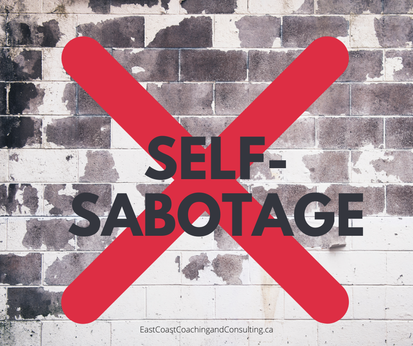The term self-sabotage makes it seem as though we are making an intentional choice - that we are truly our own worst enemy and consciously limiting, harming, or holding ourselves back. But that's not the case at all. The outward actions that tend to get labeled self-sabotage (i.e., emotionally pushing away a new partner, over-eating, or turning down an opportunity to challenge yourself) seem like "choices" we are making. But what is driving those behaviors is coming from an automatic part of your subconscious mind. Your habits + patterns are not based on conscious choice if you are automatically playing them out in a programmed way.
And while the mind is well-intentioned in trying to keep you just as you are, it is often misguided and holds you back from doing things like making positive change, venturing outside your comfort zone, or taking action on something that may seem intimidating. Your mind needs to make sense of everything in order to help you navigate through this world. So, it looks for patterns, that, when established, allow for "autopilot" reactions. Because the brain uses so much energy, it relies on having programs stored as pathways, so that it can react automatically. It’s important to keep in mind that the first however many times you did the action that eventually turned into a habit – whether it was shopping, drinking alcohol, feeling the need to seek assurance from a partner, biting your nails, worrying, etc. – on some level it was helpful to you. It may or may not have helped you to feel "good", but it likely helped you to avoid strong emotions that may have felt threatening in the moment. The lower brain grasped onto the action as being protective, as providing safety. So the next time you felt uncomfortable feelings rising up, the mind sent an urge to do the action - that thing that distracted you and helped you to feel more comfortable. When you acted on the urge, it reinforced for the brain that it was a “good thing”, that it was helpful. And so, it becomes a cycle - a habit that slides from our conscious awareness. It's so important to note that any habits you have, even those that have turned destructive, even those that you are ashamed or embarrassed of, are not who YOU are. Your habits are not character flaws or personality traits. You're not "weak" or "broken" or any other label you or others may have put on you because of your habit. It’s simply the mind doing exactly what it is designed to do. And will continue to do until we gain a deeper level of insight into what’s truly going on. A key strategy in changing habits is to learn how to gently and compassionately put some distance between "who you are at your core" and "the thoughts that you have". Especially when your thinking is pushing and encouraging you to continue doing your habit, regardless of the cost to your health and well-being. Have you felt pumped for positive change one minute and then find yourself mindlessly doing your habit...scrolling through your phone, binge eating, or criticizing others the next? What have you tried when it comes to gaining control over or changing a habit in your life? Have you used will-power or self-criticism? Maybe you've tried to figure out on an intellectual level why you do what you do and plan how you can stop or change?
For real change to happen, we need a deeper level of self-awareness around why we have the habits we do. When we actively try to control our habits, suppress them, distract from them, or beat up on ourselves because of them, it has the opposite result from what we intended. We actually strengthen and reinforce them just by placing our attention on them. It’s important to keep in mind that whatever we focus on grows in importance in our minds. So, when you are intently focused on your habit, even when you’re trying not to do it, it is still holding your attention. “Will I really be able to stop this time? “I really shouldn’t do it – I know better!” “Why do I keep doing this?!” We feed and fuel our habits in this way – with the energy of our attention - and they continue to grow more powerful. What if instead, when you hear a thought in your mind that encourages you to act on a habit that you have rationally and objectively identified as being harmful or demoralizing to your well-being, you could recognize that it is not coming from “you”? What if you practice recognizing that the thought is coming from a part of your brain that is attempting to keep status quo by maintaining a pattern, that was at one time, helpful? Our true nature, beneath the conditioning and programming, is whole, joyful, open, loving, and free from habit. Anything that contradicts that is a part of your brain that has limited information and lacks awareness, mistakenly thinking it’s keeping you “safe”. That’s a natural and normal part of the process. But, with a deeper level of awareness, instead of criticizing or shaming yourself, you can celebrate the fact that you noticed what was happening and commit to continuing to notice.
Habits don’t develop overnight and they usually don’t change overnight. But, by building your awareness around how and why your habits developed, and learning concrete ways to move past them, you can be free from the habits that have held you back! I’d love to help you gain clarity around what is driving your habits and guide you in developing a new perspective and forming new habits that are energizing and empowering! Learn More about Core-level Coaching AuthorLearn more about Bobbi Beuree, Nova Scotia-based Coach + Facilitator
2 Comments
|
AuthorBobbi Beuree, Certified CAN Coach + Facilitator is located Nova Scotia and provides interactive 1:1 coaching services, as well as group coaching events. Archives
March 2024
Blog list: |
- Home
- About
- Connect
- Blog
- Why Coaching?
-
Key Topics
- Stress Management
- Practicing Healthy Self-Care
- Dealing with Difficult Emotions
- Thinking Traps and Limiting Beliefs
- Procrastination and Lack of Motivation
- Gaining Control Over Habits
- Life Direction
- Mindfulness
- Emotional Intelligence
- Self-Management
- Interpersonal Relationships
- Anxiety
- Perfectionism
- Self-Esteem + Self-Confidence







